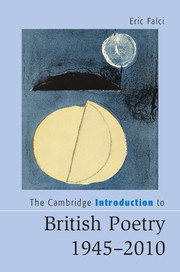Book contents
- Frontmatter
- Contents
- Acknowledgments
- Introduction
- Chapter 1 The Movement and Its Discontents
- Chapter 2 Decolonizing Poetry
- Chapter 3 Local Modernism
- Chapter 4 Late Modernism
- Chapter 5 The North
- Chapter 6 New Narratives
- Chapter 7 Platforms and Performances
- Conclusion: Archipelagic Experiments
- Notes
- Further Reading
- Index
- Cambridge Introductions to Literature
Chapter 4 - Late Modernism
Published online by Cambridge University Press: 05 November 2015
- Frontmatter
- Contents
- Acknowledgments
- Introduction
- Chapter 1 The Movement and Its Discontents
- Chapter 2 Decolonizing Poetry
- Chapter 3 Local Modernism
- Chapter 4 Late Modernism
- Chapter 5 The North
- Chapter 6 New Narratives
- Chapter 7 Platforms and Performances
- Conclusion: Archipelagic Experiments
- Notes
- Further Reading
- Index
- Cambridge Introductions to Literature
Summary
The British Poetry Revival – a many-centered configuration of poets, poems, little magazines, small presses, reading series, and conferences – has had a decisive effect on the course of poetry in the past half century. While it comprised nothing like a unified program, many of its key figures were friends and colleagues, and the groups that formed had deep affinities, sharing influences and antagonists. Seeking to resist the leanings of the Movement, as well as the institutions and aesthetics of mainstream English poetry, writers such as Eric Mottram, Bob Cobbing, J.H. Prynne, and Tom Raworth incorporated Objectivist and Projectivist practices from the United States; positioned writers like Ezra Pound, William Carlos Williams, Charles Olson, Basil Bunting, and Hugh MacDiarmid as presiding figures; and made allies with Black Mountain, Beat, and New York School poets. By the early 1970s, poets associated with the Movement were easy targets. They were writing less and less actual poetry while occupying positions of significant and easily assailable influence, such as Larkin's editorship of The Oxford Book of Twentieth Century English Verse or John Wain's stint as the Oxford Professor of Poetry (1973–1978). However, their aesthetic preferences held sway, with the short, first-person lyric of moderate scope remaining the form of choice. Much of the energy of the Revival went toward critiquing the dominance of this form and the ideologies underlying it.
The Revival encompasses the performance and concrete poetry that swirled around Cobbing in London; the lyric experiments of Wendy Mulford and Denise Riley; the varieties of innovative work emerging from Scottish poets such as Edwin Morgan, Ian Hamilton Finlay, and Tom Leonard; the dense late modernist texts of Prynne and his circle in Cambridge; and varieties of demotic regionalism, most notably the poets who clustered around Bunting in Newcastle, especially Tom Pickard and Barry MacSweeney. In this sense, the title of Andrew Crozier and Tim Longville's A Various Art (1987), the first major anthology to feature poets associated with the Revival (albeit one heavily weighted toward poets in the Cambridge wing), rings quite true. Revival poets draw heavily on American and European modernist poetics, but a number of their signal projects are – to continue the previous chapter's theme – resolutely local.
- Type
- Chapter
- Information
- The Cambridge Introduction to British Poetry, 1945–2010 , pp. 91 - 125Publisher: Cambridge University PressPrint publication year: 2015

